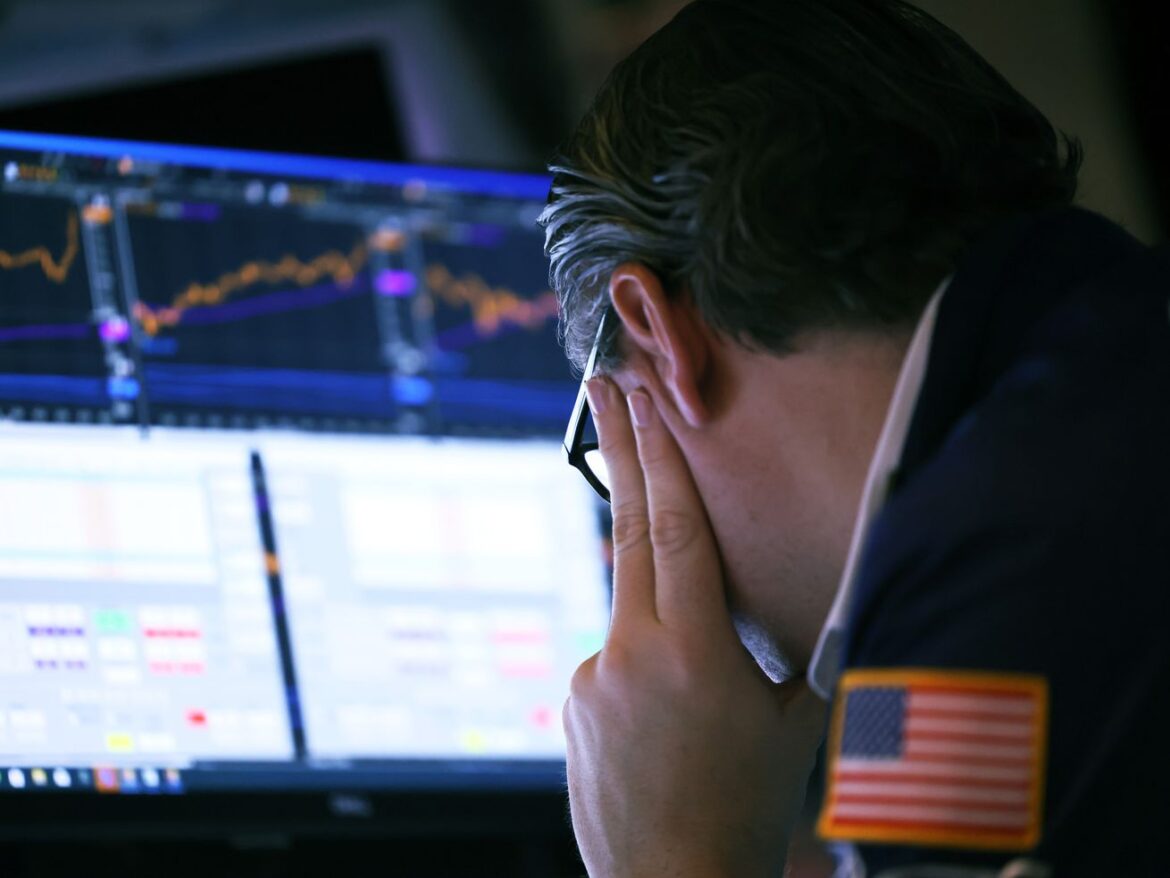Beyond Congress’s hawkishness, there are other ways of seeing the new Cold War with China.
Congress’s new China-focused committee hasn’t traveled to China yet. But they came to New York this week to meet with Wall Street executives, foreign policy leaders, and journalists in what may at times have felt like a foreign country.
That’s because New York and Washington see China rather differently.
Chairman Mike Gallagher, a Republican from Wisconsin, acknowledged the dissonance on Monday when speaking at the Council on Foreign Relations. “The median view on Wall Street on China is much different than the median, bipartisan view on China on Capitol Hill. And that’s really why we’re here,” he said. “Even those in the financial community who are less hawkish on China than I am, what they want, above all other things, is certainty, predictability, clarity.”
A bipartisan consensus on China has emerged in Washington as one of the few policy arenas where there’s continuity between Joe Biden and Donald Trump. Under that view, China poses an imminent risk to the US and international stability, and both domestic and foreign policy need to be focused on countering Beijing’s global reach.
Contrast that to New York: As America and the world’s financial hub, Wall Street executives think first of the depth of economic connection between the US and China, the challenge of fully decoupling the American economy from the Chinese (or the milder version of that which is called derisking), and the fears that the decline of US power could lead to de-dollarization (that is, the US dollar no longer serving as the anchor of the global financial system).
No one doubts that a scenario in which China were to invade neighboring Taiwan would be catastrophic for the region and the world. But the conversation in Washington has come to assume that Xi Jinping is on a seemingly inevitable path to war. Many analysts disagree, however, and fear that the zero-sum logic obscures the actual threat at hand. Gallagher and committee ranking member Raja Krishnamoorthi, a Democrat from Illinois, participated in a war game with financial leaders on how to deter a potential Taiwan war and how any conflict would affect the global economy.
For Stephen Roach, the former chief economist of Morgan Stanley and a symbol of New York’s view on Beijing, the entire premise of the war game represented a “one-sided campaign to stoke fear over China’s military intentions.” He has said that the committee is engaged in “mindless China bashing.”
While there are downsides to a foreign policy dictated by Wall Street, trying to synthesize those concerns with Washington’s could help the US chart a safer path forward in a dangerous time.
Jake Werner, a scholar at the Quincy Institute for Responsible Statecraft and author of a new report on these tensions, says that the US-China relationship has become so toxic that it’s gotten more and more difficult to have a substantive policy conversation. “All they’re hearing are voices about how China is this terrible danger,” he told me. “Our attention really needs to focus very clearly on this zero-sum structure of competition and changing that, rather than focusing on China.”
How New York sees China
In Washington’s panels and speeches, the China threat — especially toward Taiwan — has become priority No. 1, seeping into discussions of seemingly every region and conflict in the world. For the nation’s capital, China has become an all-encompassing reason to expand the already expansive US military budget, explore deals with unsavory partners like Saudi Arabia and India, and engage in protectionist policies that are designed to deliberately exclude China from semiconductors and other advanced technologies.
Meanwhile in New York, an entirely different conversation is unfolding. At a February panel hosted by the International Institute for Strategic Studies, New York Federal Reserve experts explored how constraints on the Chinese economy might affect Beijing’s international posture. Taiwan didn’t come up. There was some discussion about the slight increase in Chinese military spending in the context of economic development.
Larry Summers, the former Treasury secretary, says it’s “dangerous” to have China policy discussions dominated only by hawks. JPMorgan CEO Jamie Dimon, whose bank has significant plans for investments in China, has urged “real engagement” between the US and China. And even as Trump advanced intensive nativism and demonized China, especially during the early days of the pandemic, Wall Street saw opportunity. “I continue to firmly believe China will be one of the biggest opportunities for BlackRock over the long term, both for asset managers and investors,” Larry Fink, chairman and CEO of the world’s biggest asset manager, told shareholders in 2020. (The committee’s probes into major investment powerhouses, like BlackRock and MSCI, have spooked Wall Street.)
Though Chinese leaders have ignored Biden officials’ phone calls, the US business sector retains close contact with China. And that could be a good thing in dialing down tensions between the two countries. China and the US still have a massive trading relationship, and that kind of interconnectivity and private-sector communication was something America didn’t have with the Soviet Union during the Cold War, and it could serve as a relaxant amid the deteriorating government-to-government relationship.
Not everyone agrees. A career national security official who served in the Trump administration told me that the broader policy conversation in New York about China feels like a time warp. New York, from their perspective, still isn’t convinced of the threat, which feels like a throwback to five years ago when they were trying to convince other federal agencies that China was indeed a top security priority.
In fact, Wall Street seems to want to go back even further, this former official thinks — back to the early Obama years or even earlier, when a constructive US-China relationship seemed possible. “The idea of papering over stuff and having happy meetings is exactly what got us into this mess. The idea of shelving our disputes and pushing things off and ignoring them has hurt us tremendously. I think that is quite accepted here in Washington, and that is the stance of both the Trump and the Biden administrations. But in New York, that’s not the case,” they said.
For his part, Rep. Gallagher says that Wall Street is literally financing the Chinese military.
“People in this room probably disagree with my views about the level of restrictions we should put on American capital going to China,” Gallagher said at the Council on Foreign Relations. “Some of the biggest differences are not necessarily Democrat versus Republican.”
How Washington sees China
Established this year, the House Select Committee on Strategic Competition between the United States and the Chinese Communist Party has no legislative power. But it is using its platform, and primetime hearings, to shape the Washington conversation around the economic, technological, and security challenges that China poses.
/cdn.vox-cdn.com/uploads/chorus_asset/file/24922352/1257749242.jpg)
Tom Williams/CQ-Roll Call, Inc via Getty Images
Committee members have traveled to Detroit to meet automakers, Iowa to meet farmers, and Wisconsin to meet manufacturers — all of whom have economic interests in China. Some have been abroad to Australia and Papua New Guinea. In February, Gallagher took a secret trip to Taiwan. But if the committee is hearing from a diversity of policy voices, it’s not apparent from their public hearings; many experts who have testified largely share the view that China poses an existential threat to the United States.
That view has translated to policy. The Biden administration has created new multilateral forums, especially in Asia, to exclude China. Biden has kept in place Trump’s tariffs on China and scaled up Trump’s export controls and sanctions designations, and promised new bans that build on the semiconductors blockade.
Bipartisanship is a defining characteristic of the China Select Committee — as it is in China policy more widely, a rarity in today’s Washington — yet there are some disagreements between the two parties. Consider the diplomatic blitz of US cabinet officials like the secretaries of State, Treasury, and Commerce traveling to China in recent months. “You have to have dialogue. And when you’re talking, you’re not fighting,” Krishnamoorthi, the Democratic ranking member, said at CFR. “Sometimes my Republican counterparts … fear that we are making concessions before we talk to the CCP [Chinese Communist Party]. And I disagree. I think you can talk and you can walk and chew gum at the same time.” Gallagher, by contrast, has criticized the administration’s recent trips and engagement with China.
Is there a midpoint between the two views?
Like the Biden and Trump administrations, the congressional committee frames the challenge around strategic competition.
Werner, the Quincy Institute researcher, argues in a new policy report that the term “competition” vastly misstates what’s really going on between the US and China, especially since Trump. This isn’t like a competition between Coke and Pepsi, Werner writes, but something more akin to the zero-sum rivalry between the Sinaloa and Jalisco drug cartels — and that helps explain why China has reacted so forcefully to a barrage of US policies that seek to shut China out of global systems.
“The reason that there’s this danger of escalating out of control is because there’s this underlying zero-sum structure of competition,” he told me. “And the desire to exclude China in the extensive and unprecedented ways that the Trump administration and the Biden administration have pursued, that comes from a sense of Chinese competition as being an intolerable threat, so we have to remove it and therefore exclude it.”
In the process, Washington views everything China-related through a security lens. “You can see it very clearly in the hypersensitivity to a Chinese presence anywhere, about anything, in the United States that suddenly sets off alarm bells,” Werner explained.
In some senses, the Biden administration may appreciate the drawbacks of a purely exclusionary approach. “I don’t want to contain China,” Biden said while traveling to Vietnam last week. “I just want to make sure that we have a relationship with China that is on the up and up, squared away, everybody knows what it’s all about. And one of the ways you do that is you make sure that we are talking about the same things.”
It almost sounds like a recognition that excluding China might not work and that a pragmatic and successful approach must transcend the New York and Washington bubbles. The task is urgent. No one wins in a superpower war.



